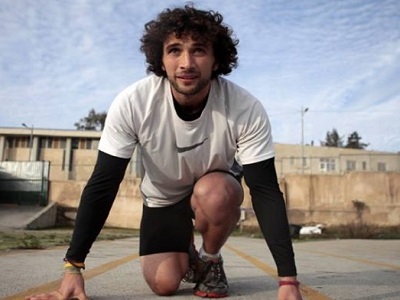
The Rio Olympics 2016 has drawn the attention of viewers worldwide – especially for the Palestine 6-member team which is the largest ever delegation from the region to an Olympics Games. However, not all Olympics-hopefuls made it to the sporting area. One such talented athlete is Muhammed al-Khatib, the 100-meter Palestinian sprinter who dreamed of becoming an Olympic sprinter. He just first needed a track.
As a native of Hebron, a divided city in the southern West Bank, living under Israeli occupation, Khatib never had access to sports facilities of any kind. Most were destroyed in the Second Intifada, between September 2000 and February 2005 when an estimated 3,000 Palestinians and 1,000 Israelis lost their lives.
“It was full-on war,” said Khatib. “The last thing a lot of people think about [in that environment] is sports.”
Mohammad AL Khatib, a Palestinian runner dreaming to participate and win the Olympics https://t.co/RLitz8XjOm
— The MPP (@MPPWashingtonDC) April 9, 2016
In their Hebron home Mohammed’s parents recalled the time saying “We all slept in one room together” to protect themselves from the shelling. Mohammed’s mother Latifa said. “Every day was about mere survival.”
Despite the obstacles, Mohammed — the youngest of the four siblings — dreamed of a future outside the confines of Hebron, said his father, Awni, “Mohammed always thought of himself as a champion,” said Awni, a chemistry professor and university dean in Bethlehem.
When Khatib went to study at Birzeit University, just outside Ramallah, in 2010, track and field was not something even on his radar.
That all changed in August 2012 when Khatib watched the male track and field events at the London Olympic Games. Many runners, he noted, hailed from smaller, developing countries that typically went unnoticed in the world of global sport.
He knew that “that this is what I wanted to dedicate my life to.” With no access to any professional coaching, he scoured YouTube for instructional videos on the techniques of track and field.
He put into practice what he learned on the internet on his university track which was only 200 meters around, not the standard 400 meters, and the straightaway was 84 meters long, as opposed to the recognized 100 meters. The track was also asphalt, a surface potentially hazardous for runners’ knees.
By 2014, Khatib was one of the fastest sprinters in the West Bank. He contacted Bill Collins, one of the most decorated sprinters in U.S. track history to never run in an Olympic games. Collins had met Khatib in 2013, briefly training him.
The young sprinter, Collins says, was raw. He owned no running spikes and had never seen a starting block before.
In an e-mail, Khatib plead for help. Despite being sceptical, Collins “accepted the challenge.”
https://youtu.be/tXGwVqk62Kk
Khatib launched an Indiegogo crowdfunding page to raise roughly $9,000 that would cover airfare, three months of training with Collins and accommodation. The page went viral and Khatib raised $12,000 in just 72 hours.
When Khatib arrived at Rice University’s track stadium in January for his first full training session with Collins, he said, “I immediately felt ‘wow, this is the real deal.”
Of Muhammed, Collins has said, “There’s no failure in Mohammed.”
Since January, they have worked from scratch on every aspect of Khatib’s form. Khatib is the only athlete trained by Collins who puts in two practices a day. He lived in a bare apartment with a Palestinian flag on the wall, and had virtually foregone any social life. With no access to a car, he typically rode his bicycle to practice.
https://twitter.com/ZabMustefa/status/669297562046828544
However, Khatib failed to make the qualifying time for the Olympics. Despite this, however, he said, “The more I go forth on this journey the more I am realizing that it transcends the physical training; it is a journey that rebuilds the bridges that once connected us all as one. As one phase ends another one begins, and this one beings with more strength and persistence.
“This journey has taught me that all our dreams and visions are at the grasp of our hands. It all starts with an intention in the heart, a thought in the mind, and an action with the hands (or in my case with my feet).”
“For now I go back to Palestine, to recharge and center myself before I venture into the next 4 years of training.”
He also said, “I extend my deepest gratitude to every one of you. I would have never done it without your support and motivation. Thank you so much for being part of this collective journey and dream.”
“All my Love”
(Additional Information: NBC NEWS)





